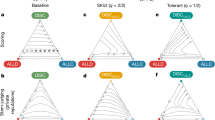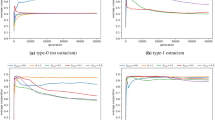Abstract
Trust presents a number of problems and paradoxes, because existing theory is not fully adequate for understanding why there is so much of it, why it occurs, and so forth. These problems and paradoxes of trust are vitally important, for trust is thought to be the essential glue that holds societies together. This paper explores the generation of trust with two simple, but very different models, focusing on repeated play of the Stag Hunt game. A gridscape model examines creation of trust among cognitively basic simple agents. A Markov model examimes play between two somewhat more sophisticated agents. In both models, trust emerges robustly. Lessons are extracted from these findings which point to a new way of conceiving rationality, a way that is broadly applicable and can inform future investigations of trust.
Preview
Unable to display preview. Download preview PDF.
Similar content being viewed by others
References
Binmore, K.: Fun and games: A text on game theory. D.H. Heath and Company, Lexington (1992)
Camerer, C.F.: Behavioral game theory: Experiments in strategic interaction. Russell Sage Foundation. Princeton University Press, New York (2003)
Elster, J.: The cement of society: A study of social order. Studies in rationality and social change. Cambridge University Press, Cambridge (1989)
Friedman, J. (ed.): The rational choice controversy. Yale University Press, New Haven (1996); Originally published as Critical Review 9(1–2) (1995)
GameTheory.net, Assurance game, http://www.gametheory.net/Dictionary/Games/AssuranceGame.html (accessed February 8, 2005)
GameTheory.net, Stag hunt, http://www.gametheory.net/Dictionary/Games/StagHunt.html (accessed February 8, 2005)
Giraldeau, L.-A., Caraco, T.: Social foraging theory. Princeton University Press, Princeton (2000)
Gintis, H.: Game theory evolving: A problem-centered introduction to modeling strategic interaction. Princeton University Press, Princeton (2000)
Green, D.P., Shapiro, I.: Pathologies of rational choice theory: A critique of applications in political science. Yale University Press, New Haven (1994)
Harsanyi, J.C., Selten, R.: A general theory of equilibrium selection in games. MIT Press, Cambridge (1988)
Kimbrough, S.O.: A note on exploring rationality in games, Working paper, University of Pennsylvania, Philadelphia, PA (March 2004); Presented at SEP (Society for Exact Philosophy) (spring 2004), http://opim-sun.wharton.upenn.edu/~sok/comprats/2005/exploring-rationality-note-sep2004.pdf
Kimbrough, S.O.: Notes on MLPS: A model for learning in policy space for agents in repeated games, working paper, University of Pennsylvania, Department of Operations and Information Management (December 2004), http://opim-sun.wharton.upenn.edu/~sok/sokpapers/2005/markov-policy.pdf
Kimbrough, S.O., Lu, M., Kuo, A.: A note on strategic learning in policy space. In: Kimbrough, S.O., Wu, D.J. (eds.) Formal Modelling in Electronic Commerce: Representation, Inference, and Strategic Interaction, pp. 463–475. Springer, Berlin (2004)
Kreps, D.M., Milgrom, P., Roberts, J., Wilson, R.: Rational cooperation in the finitely repeated prisoners’ dilemma. Journal of Economic Theory 27, 245–252 (1982)
Luce, R.D., Raiffa, H.: Games and decisions. John Wiley, New York (1957); Reprinted by Dover Books (1989)
Smith, J.M.: Evolution and the theory of games. Cambridge Univesity Press, New York (1982)
Rapoport, A., Guyer, M.J., Gordon, D.G.: The 2×2 game. The University of Michigan Press, Ann Arbor (1976)
Rousseau, J.J.: A discourse upon the origin and the foundation of the inequality among mankind (February 17, 2004), http://www.gutenberg.org/etext/11136 (Originally published, in French, in 1755)
Sen, A.K.: Rational fools: A critique of the behavioural foundations of economic theory. Philosophy and Public Affairs 6, 317–344 (1977)
Stephens, D.W., Krebs, J.R.: Foraging theory. Princeton University Press, Princeton (1986)
Skyrms, B.: Evolution of the social contract. Cambridge University Press, Cambridge (1996)
Skyrms, B.: The stag hunt and the evolution of social structure. Cambridge University Press, Cambridge (2004)
Van Huyck, J.B., Battalio, R.C., Beil, R.O.: Tacit coordination games, strategic uncertainty, and coordination failure. The American Economic Review 80(1), 234–248 (1990)
Van Huyck, J.B., Battalio, R.C., Beil, R.O.: Strategic uncertainty, equilibrium selection, and coordination failure in average opinion games. The Quarterly Journal of Economics 106(3), 885–910 (1991)
Author information
Authors and Affiliations
Editor information
Editors and Affiliations
Rights and permissions
Copyright information
© 2005 Springer-Verlag Berlin Heidelberg
About this paper
Cite this paper
Kimbrough, S.O. (2005). Foraging for Trust: Exploring Rationality and the Stag Hunt Game. In: Herrmann, P., Issarny, V., Shiu, S. (eds) Trust Management. iTrust 2005. Lecture Notes in Computer Science, vol 3477. Springer, Berlin, Heidelberg. https://doi.org/10.1007/11429760_1
Download citation
DOI: https://doi.org/10.1007/11429760_1
Publisher Name: Springer, Berlin, Heidelberg
Print ISBN: 978-3-540-26042-4
Online ISBN: 978-3-540-32040-1
eBook Packages: Computer ScienceComputer Science (R0)




